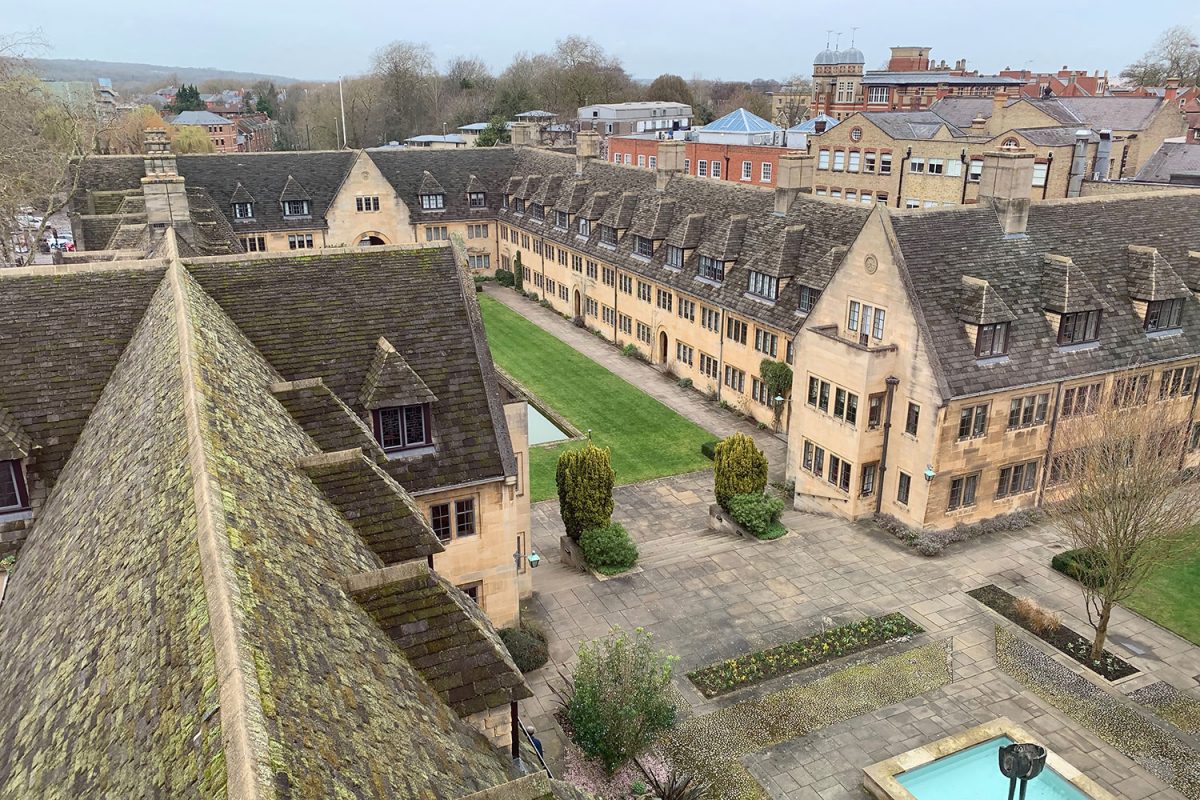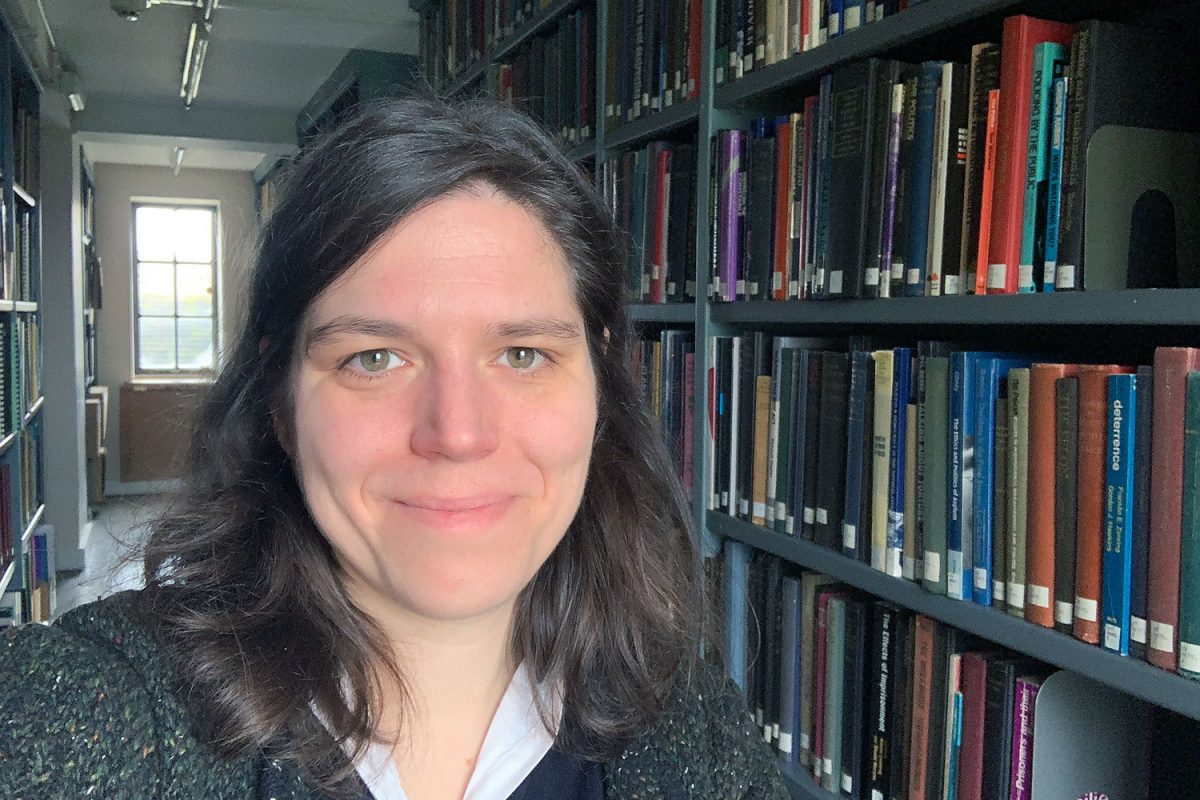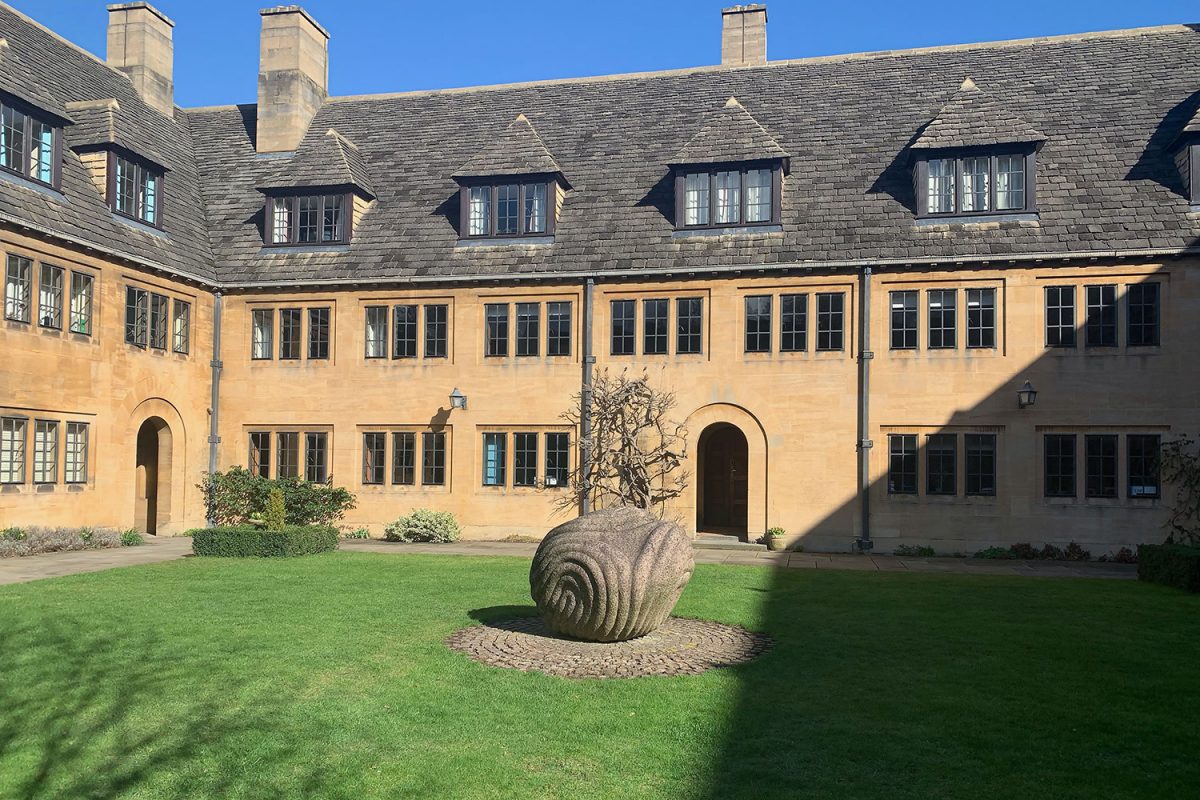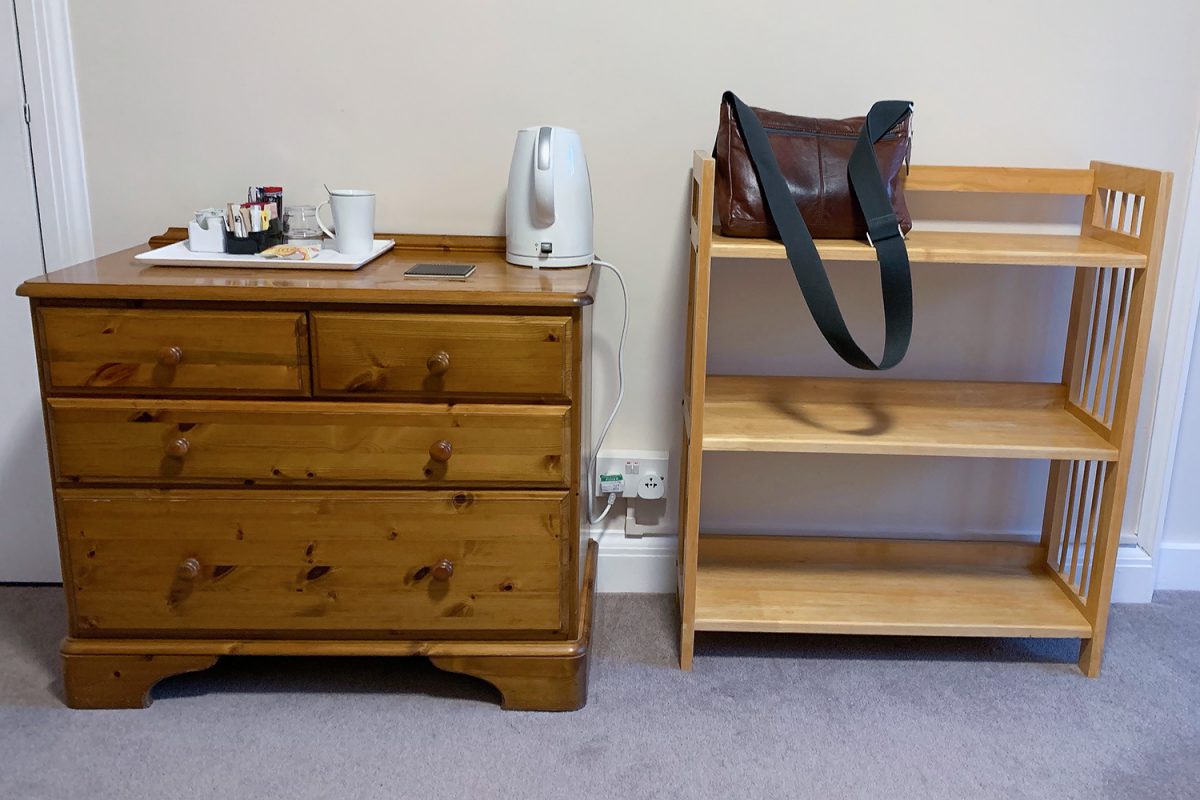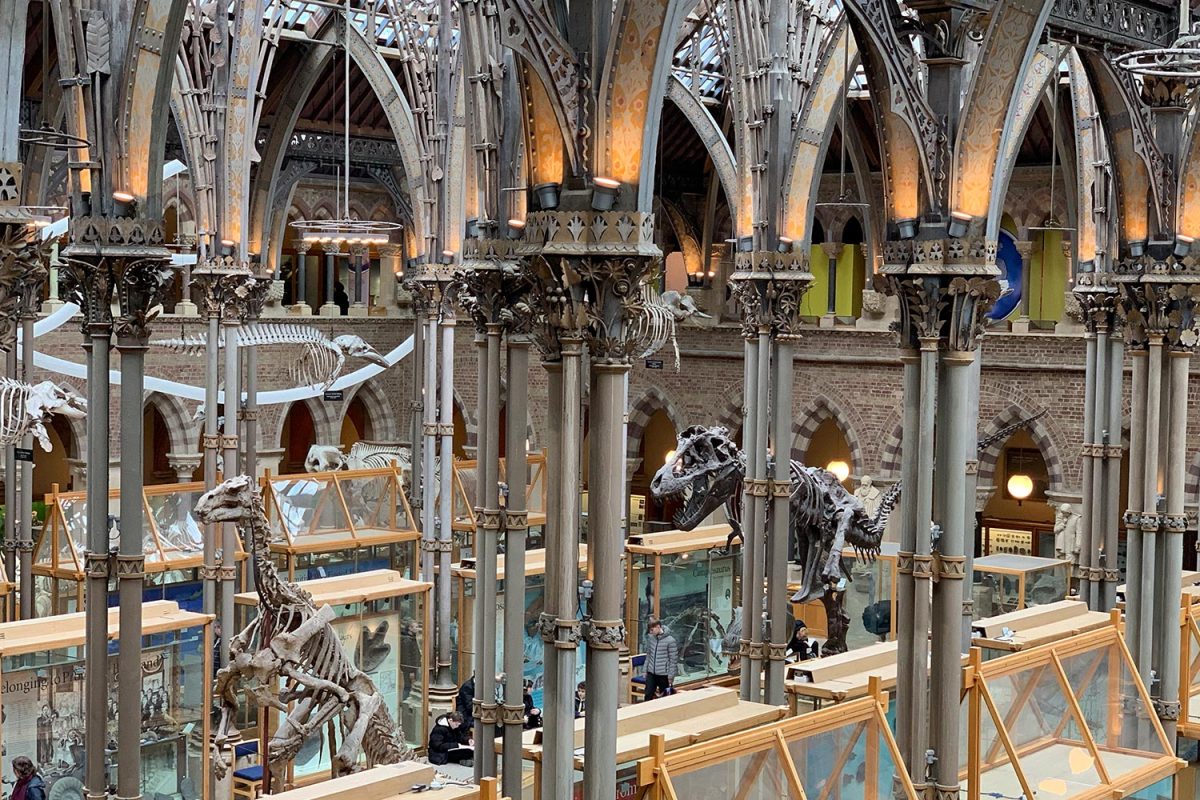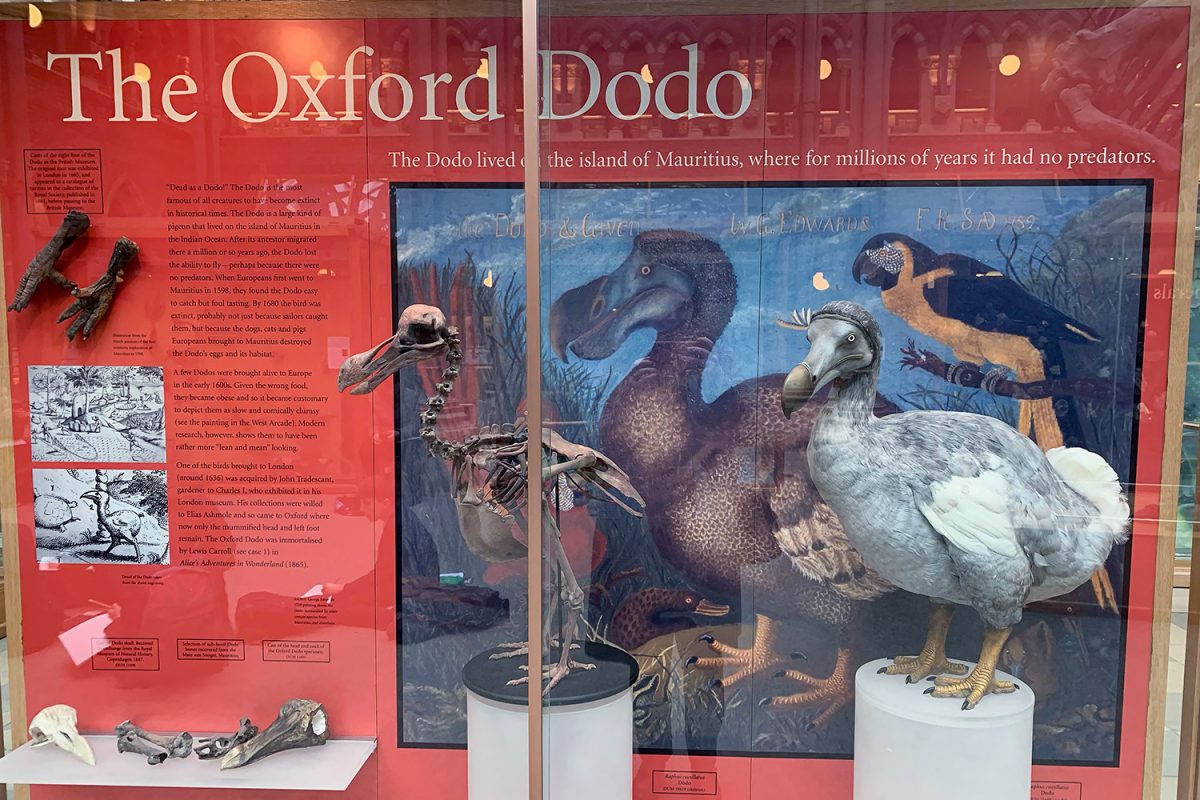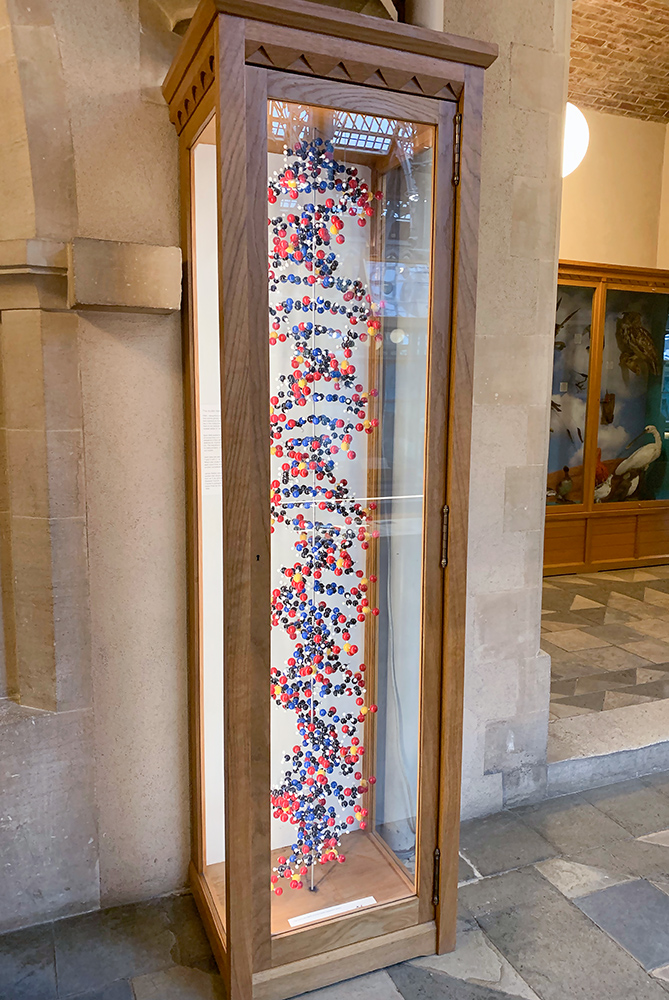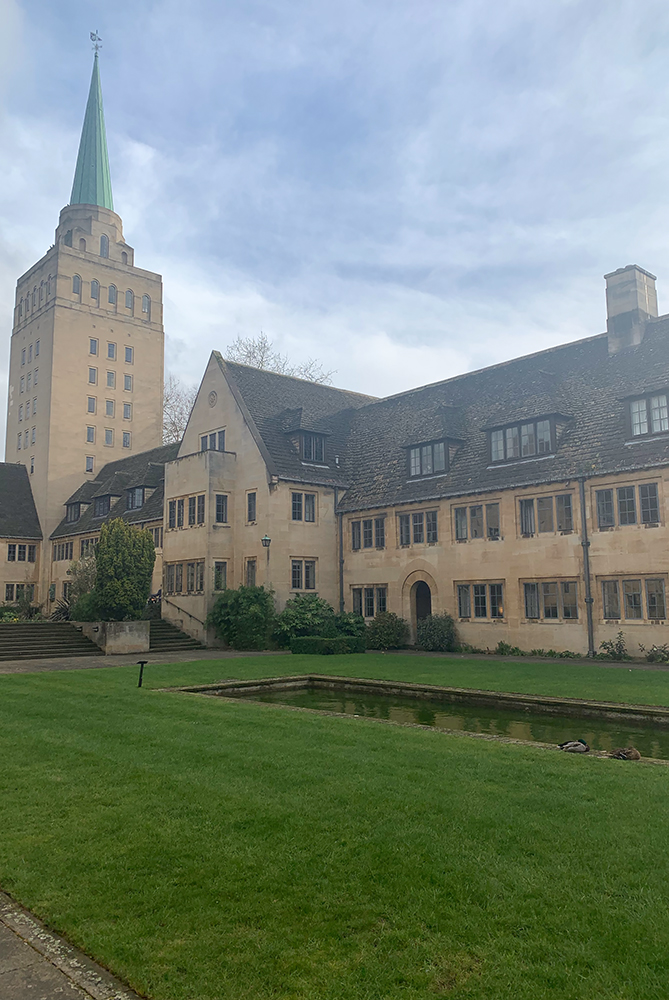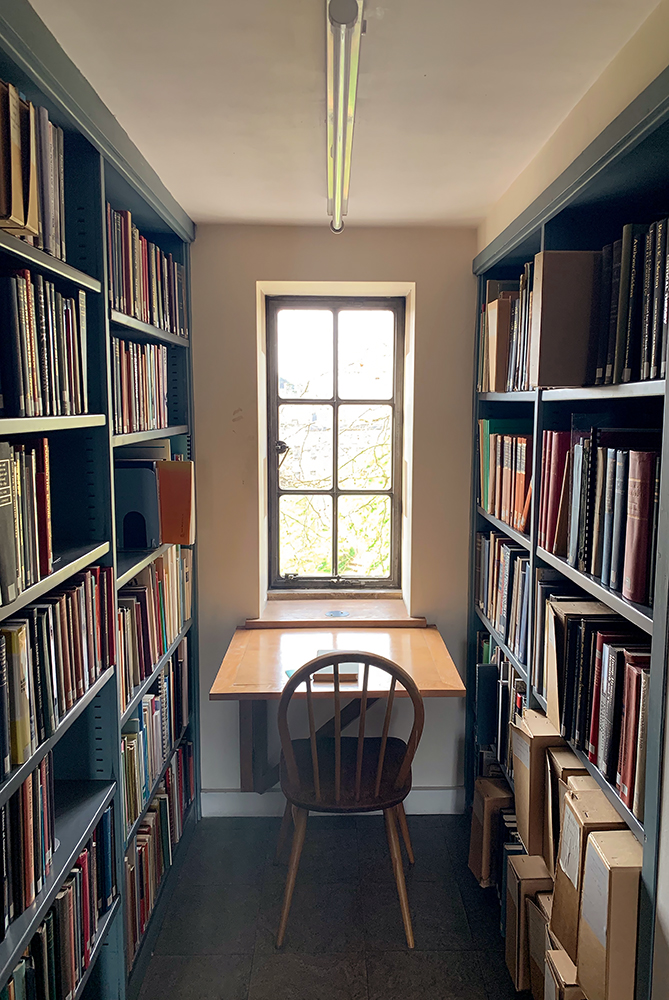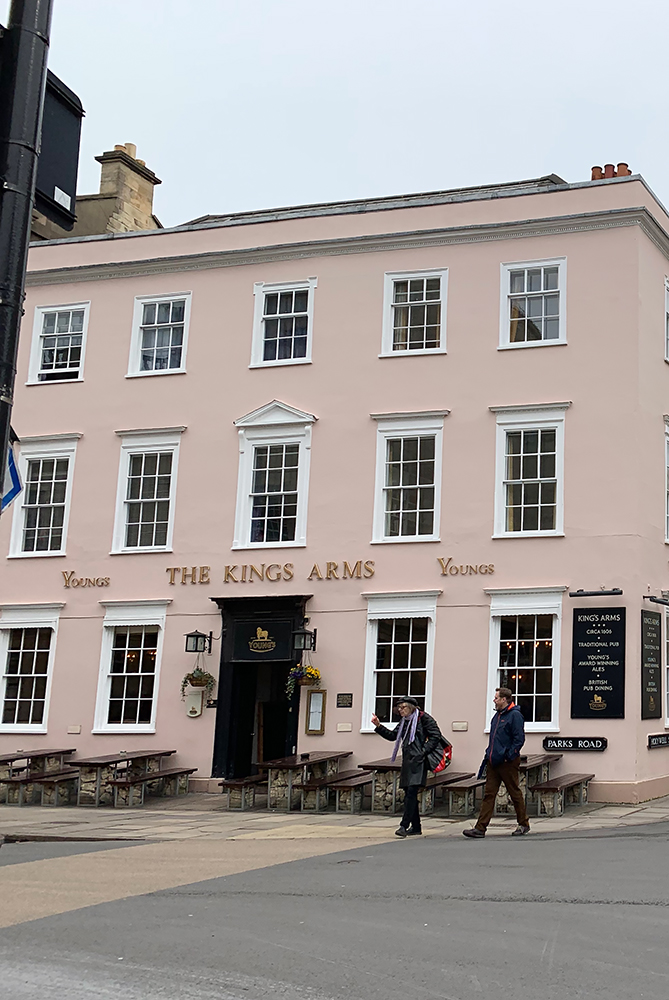Post aus … Oxford Postdoktorandin Dr. Nicole Holzhauser berichtet aus England
Nicole Holzhauser verbrachte im Rahmen des Mentoring-Programms für Postdoktorandinnen der Stabsstelle Chancengleichheit eine Woche in Oxford und berichtet bei „Post aus …“ rückblickend von ihren Erfahrungen.
Hier war ich zu Besuch:
Oxford, England.
Das habe ich in Oxford gemacht:
Im Rahmen des Mentoring-Programms für Postdoktorandinnen besuchte ich Professor Melinda Mills am Nuffield College der University of Oxford. Sie ist dort Professorin für Soziologie und Centre Director des an der University of Oxford neu gegründeten internationalen Leverhulme Centre for Demographic Science (LCDS). Ziel des Mentoring-Programms ist es, Postdoktorandinnen in ihrer wissenschaftlichen Laufbahn unter anderem mit One-to-One-Mentorings durch eine erfahrene Professorin oder einen erfahrenen Professor zu unterstützen.
Mein Aufenthalt dauerte insgesamt:
Mein erster Besuch am Nuffield College diente dem gegenseitigen Kennenlernen und dauerte eine Woche. Im Laufe des Jahres werde ich zurückkehren und etwas länger bleiben können.
Darum habe ich mich für das Auslands-Mentoring entschieden:
Im Studium war ich für ein Auslandssemester in Brasilien und auch während meiner Tätigkeit als wissenschaftliche Mitarbeiterin habe ich als Dozentin im Ausland interkulturelle Erfahrungen gesammelt, die ich als horizonterweiternd und beruflich sowie persönlich bereichernd erlebt habe. Seit 2008 arbeite ich als wissenschaftliche Mitarbeiterin am Institut für Sozialwissenschaften der TU Braunschweig, 2014 habe ich dort promoviert. Je weiter ich in meiner wissenschaftlichen Karriere komme, umso deutlicher sehe ich, dass Wissenschaft keine Grenzen hat und auch keine anerkennen sollte. Wissenschaft ist ein internationales und globales Unterfangen. Deshalb habe ich mich für ein internationales Mentoring an einer interdisziplinären Schnittstelle entschieden: In Oxford leben und arbeiten Wissenschaftlerinnen und Wissenschaftler aus der ganzen Welt zusammen.
Leben vor Ort
So habe ich in Oxford gewohnt:
Das Leben in Oxford ist teuer. Viele wissenschaftliche Mitarbeiterinnen und Mitarbeiter leben etwas außerhalb, zum Beispiel südlich des Stadtkerns im früheren Arbeiterviertel und heutigen kulturellen Melting pot Cowley. Oder im östlich gelegenen Headington, wo einst schon J. R. R. Tolkien oder C. S. Lewis wohnten. Nach meiner Ankunft am Sonntag habe ich die erste Nacht in Cowley in einem sehr netten Airbnb-Zimmer verbracht. Die restliche Woche hatte ich das Glück im College wohnen und arbeiten zu dürfen. In ihrem Alltag pendeln Sozialwissenschaftlerinnen und Sozialwissenschaftler zwischen Nuffield und dem Department of Sociology, das an der Manor Road liegt, hin und her.
Was unterscheidet das Arbeiten in England von dem in Deutschland?
Während wissenschaftliche Mitarbeiterinnen und Mitarbeiter an deutschen Universitäten auch schon vor der Promotion im akademischen Berufsleben stehen, werden Doktorandinnen und Doktoranden in Großbritannien noch eher als Studierende gesehen, ähnlich wie Promovierende an einer Graduate School in Deutschland. Das hat Vor- und Nachteile. Von Vorteil ist beispielsweise, dass sie intensiver betreut werden, dass sie wenig oder gar nicht in die Lehre eingebunden sind und genügend Zeit für ihre Forschungsarbeiten haben. Nachteile können weniger praktische Berufserfahrung und eine gefühlt längere (Aus-)Bildungszeit sein. Bei den Postdoktorandinnen und Postdoktoranden gibt es die Unterscheidung zwischen Stipendiatinnen/Stipendiaten und Mitarbeiterinnen/Mitarbeitern. Allerdings sind Postdocs in ihrem Selbstverständnis viel unabhängiger, sodass sich eine starke Zusammenarbeit auf Ebene der Postdocs wie auch im Austausch mit Professorinnen und Professoren entwickelt. In jedem Fall ist eine wissenschaftliche Tätigkeit an einer international so erfolgreichen Universität wie Oxford für die berufliche Perspektive von großem Vorteil. Der Aufenthalt am College hat mich auf immer neue Weise herausgefordert und bereichert: durch ständig wechselnde internationale Besucherinnen und Besucher und durch die große Zahl an – zumindest am sozialwissenschaftlichen Nuffield College fachnahen – Postdoc-Kolleginnen und -Kollegen auf derselben Qualifikationsstufe. Dadurch erhält man die Chance, sich für eine langfristig erfolgreiche wissenschaftliche Karriere bestens aufzustellen.
Besonders typisch für mein Aufenthaltsland ist:
Die Universitätsstruktur ist anders als in Deutschland. Die Universität Oxford besteht aus unabhängigen und (überwiegend) jahrhundertealten Colleges. Oxford ist eine der ältesten Universitäten Europas und der Welt. Das spürt man in der Stadt und im Universitätsleben. An fast allen Colleges gibt es bestimmte historische Zeremonien, in denen der wissenschaftliche und soziale Austausch geradezu zelebriert wird, wie zum Beispiel beim „High Table Dinner“. Hierbei handelt es sich um ein förmliches Abendessen, bei dem ganz bestimmte Rituale eingehalten werden. So tragen die Professorinnen und Professoren Talare und auch die Gäste kleiden sich feierlich nach ganz bestimmten Regeln. Selbst die Konversationsetikette ist vorgegeben. Meine Erfahrung war gleichzeitig aber auch, dass bei Tisch viel gelacht wurde und die Atmosphäre trotz ihrer Feierlichkeit entspannt war. Ein Klischee über Großbritannien schreibt den Briten eine große Sympathie für Traditionen und Regeln zu. Auch die internationalen Forscherinnen und Forscher, mit denen ich während meines Aufenthalts viel zu tun hatte, haben sich – oft auch mit einem Augenzwinkern – daran orientiert. Besonders liebenswert finde ich, dass in Großbritannien alle stets höflich und freundlich im Umgang miteinander sind und dass selbst Streitgespräche meist äußerst charmant ablaufen.
Das habe ich in den ersten drei Tagen gelernt:
Am College hat die Wissenschaft nie Pause – bei Lunch, Tea Time, oder Low und High Table Dinner treffen sich die Forschenden und unterhalten sich über ihre Interessen, ihre Forschung sowie aktuelle Problemstellungen. Es ist schon eine kleine Herausforderung bei den vielen interessanten Gesprächen das Essen und Trinken nicht zu vergessen.
Die bisher größte Herausforderung während meines Aufenthaltes:
Im stürmischen Regen einen Schirm aufzuspannen – ich habe es erst gar nicht versucht. Es scheint mir vielmehr „very British“ zu sein, den Regen einfach höflich zu ignorieren.
Das nehme ich von hier mit nach Hause:
Mentoring ist ein wichtiges Entwicklungsinstrument und mit Professorin Melinda Mills war es eine großartige Erfahrung, auf deren Fortsetzung ich mich freue. Ich habe neue Weggefährtinnen und Weggefährten kennengelernt. Der Austausch mit Gleichgesinnten, auch manchmal ein Innehalten und Nachdenken über Ideen, Träume und Herausforderungen sind wichtig und lassen uns und unsere Arbeit wachsen und gedeihen.
Gut zu wissen
Diese landestypische Speise sollte man unbedingt probieren:
Scotch Egg mit Senf und ein kühles Cider im King´s Arms.
Welches Fettnäpfchen sollte man in England vermeiden?
Man sollte niemals versuchen, etwas darzustellen, was man nicht ist. Das gilt, glaube ich, auch überall sonst auf der Welt. Aber in England hat man aufgrund der feinen gesellschaftlichen Unterscheidungen hinsichtlich Kleidung, Sprache und Verhaltensregeln ein besonderes Gespür dafür, ob jemand authentisch er oder sie selbst ist oder nur so tut als ob.
Diesen Tipp gebe ich anderen Studierenden oder wissenschaftlichen Beschäftigten, die ins Ausland gehen möchten:
Geh raus und suche den Austausch mit den Menschen. Wir lernen am meisten, wenn wir uns auf die Welt um uns herum einlassen und sie nehmen, wie sie ist. Denn die Wirklichkeit ist meistens ganz anders, als wir sie uns zuvor ausgedacht haben. Folge dem weißen Kaninchen, es zeigt dir den Weg ins Abenteuer!
Post from … Oxford
Postdoc Nicole Holzhauser reports from England
Nicole Holzhauser spent a week in Oxford as part of the mentoring program for female postdoctoral candidates of the Equal Opportunity Office at TU Braunschweig and reports on her experiences at „Post aus …“.
Here I was visiting:
Oxford, England.
What I did in Oxford:
As part of a mentoring program of the Equal Opportunity Office for Postdoctoral Women at TU Braunschweig, I visited Professor Melinda Mills at Nuffield College, University of Oxford. She is Professor of Sociology and Centre Director of the new founded international Leverhulme Centre for Demographic Science (LCDS) at the University of Oxford. The aim of the mentoring program is to help postdoctoral researchers to develop their scientific career through a one-to-one mentoring by an experienced professor.
My stay lasted in total:
My first visit to Nuffield College was a get-together and lasted one week. During this year I will be able to return and likely stay a little longer.
That’s why I decided to go abroad for mentoring:
During my studies I spent a semester abroad in Brazil, and during my work as a research assistant, I also gained intercultural experience as a lecturer abroad, which I experienced as enriching my horizons professionally as well as personally. Since 2008, I work as a research assistant, and since 2015 as a research fellow at the Department of Social Sciences at the TU Braunschweig, where I received my doctorate degree in 2014. The further I get in my scientific career, the clearer I see that science has no limits. Science is an international and global endeavour. That’s why I’ve chosen an international mentoring. In Oxford, scientists from all over the world come and work together.
Life on the spot
That’s how I lived in Oxford:
Living in Oxford is rather expensive. Many researchers live outside, for example, south of the city centre in the former working-class district and present-day cultural melting pot of Cowley, or a bit east in Headington, where once J. R. R. Tolkien or C. S. Lewis lived. Upon my arrival on Sunday, I spent the first night in Cowley in a very nice Airbnb. As a guest, I experienced the privilege of living and working in college during the rest of the week. In their everyday lives, social scientists move between Nuffield and the Department of Sociology on Manor Road.
What makes working in England different from working in Germany?
While academic staff at German universities already take part in the academic employment life before their Ph.D. graduation, Ph.D. students in the UK are more likely to be seen as graduate students (similar to doctoral candidates at a graduate school in Germany). This has advantages and disadvantages. Advantages connected to this status are, for example, more supervision and support, little or no teaching obligations and enough time for research work. Disadvantages may be less employment experience and one may feel that education time is to be somewhat prolonged. With postdoctoral researchers, there is also a distinction between scholarship holders and employees. However, postdocs are in general already quite independent researchers, so that a strong cooperation develops on the level of postdocs as well as with the professors. In any case, any scientific position (as well as an education) at an internationally successful university like Oxford is a great advantage from the professional perspective. Staying and working in college challenges scientists constantly in ever new ways, thus gives you the chance to build up a very solid foundation for a successful long-term scientific career.
Especially typical for my country of residence is:
The university structure is significantly different from the one in Germany. The University of Oxford consists of independent and (mostly) centuries-old colleges. Oxford is one of the oldest universities in Europe and the world. You can feel this in the city and in university life. At almost all colleges, there are certain historical ceremonies in which the scientific and social exchange is ritually celebrated, such as the High Table Dinner. This is a formal dinner that follows certain rituals. The professors wear gowns and the guests also dress according to specific rules. Even the conversation etiquette is somehow given here. However, my experience was also that there was a lot of laughter and the atmosphere was relaxed and very open minded at the table. A cliché about Great Britain seems to attribute great sympathy to traditions and rules to the British. I find it especially lovable that everyone is always polite and friendly in dealing with each other and that disputes are usually carried out very charmingly.
I learned that in the first three days:
Science never stops at college – at lunch, tea time, or low and high table dinners, researchers meet and discuss their interests, research, and current issues. During the many interesting conversations, it is sometimes a challenge not to forget the food and drink.
The biggest challenge so far during my stay:
To open an umbrella in the stormy rain – I did not even try. Rather it seems to me to be „very British“ to just ignore the rain in the most politely way possible.
I take this home with me:
Mentoring is in any case important. With Professor Melinda Mills it was a great experience and I am looking forward meeting her again soon. She and her team made me feel welcome – I met new companions. Sharing thoughts with like-minded people, sometimes pausing and thinking about ideas, dreams, and challenges is important and makes us and our work grow and thrive.
Good to know
You should definitely try this typical dish:
Scotch Egg with mustard and a cool cider at King’s Arms.
Which sand trap should be avoided in England?
You should never try to represent someone whom you are not. I believe, this holds true everywhere in the world, but in England, because of the subtle social distinctions over clothing, language and behavioural rules, one has a special sense of whether someone is authentic or only pretends.
I give this hint to other students or scientific employees who want to go abroad:
Go out and seek the exchange with people. We learn the most when we embrace the world around us and take it as it is. Because reality is usually very different from what we imagined it to be. Don’t be afraid to follow the white rabbit, it shows you the way to adventure!

